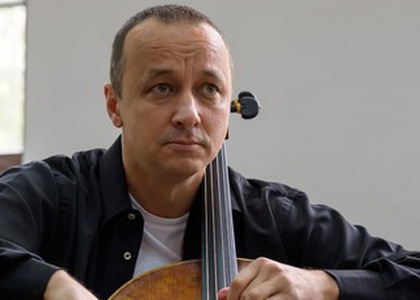> Interviews

Interview with cellist Răzvan Suma
Mr. Răzvan Suma, on December 4th, 2024, Sala Radio will host the Radio Chamber Orchestra concert, an event included in the ArtCello festival, a series that continues the tradition of major international cello festivals. What other events has this series included, and how do you see the CellEast festival positioned in this context?
There is very close collaboration among us, the organizers of cello festivals. The connections are not only professional but also deeply personal-we are great friends. This characteristic defines the partnerships in the cello world, and I hope other instruments will align with these beautiful collaborations. The ArtCello festival originated in Bulgaria, where it is part of another series of events, the Cellissimo festival, now in its fifth year. Cellist Atanas Krastev is the organizer and performer in the ArtCello festival, which was also hosted in Ukraine under the leadership of Denis Severin, an Ukrainian organizer. Four or five years ago, I was invited to this festival and had extraordinary experiences performing in remarkable venues in Ukraine. Unfortunately, music no longer has its place in that country at the moment. Thus, thanks to the flexibility and willingness of Radio România to collaborate with the ArtCello festival, this series was invited to Romania, becoming an itinerant festival. The guest artists include Denis Severin, who is both the organizer and the soul of this festival, Anne Gastinel, an extraordinary cellist, soloist, and renowned professor in Lyon, and Thomas Demenga, a prominent and remarkable figure from Switzerland.
I will also perform to serve as a bridge of collaboration between them. However, the stars of this concert are these great soloists whom the festival brings to the Romanian stage. The repertoire has been chosen exceptionally well. It includes some of the most important works in the cello repertoire, such as Schumann's Cello Concerto-a fantastic and iconic piece for cellists-and Vivaldi's famous Concerto for Two Cellos. Additionally, Anne Gastinel will perform Haydn's Concerto in D Major. I believe this is one of the most important and interesting repertoires, and I hope people will come in large numbers, as this could truly be a unique experience in every sense.
How did you build your interpretation of David Popper's Hungarian Rhapsody with conductor Grigor Palikarov?
For me, it's a relatively new piece, so to speak. I've only performed it once before, although it is very dear to me. Sometimes, you end up staying away from a repertoire you love deeply as a music lover. I've also taught this piece many times but have only performed it once, in Brașov.
Popper's Hungarian Rhapsody is a collection of folk elements from all regions of Hungary. It represents Hungarian folklore and perhaps includes Romanian and Romani influences as well, which is very common in folk music. After all, the transmitters of folklore across Eastern Europe and the Balkans were often the Roma people, and we owe them our gratitude for preserving this heritage through music.
Translated by Sorana Andreea Dumitrescu,
University of Bucharest, Faculty of Foreign Languages and Literatures, MTTLC, year I
Corrected by Silvia Petrescu














